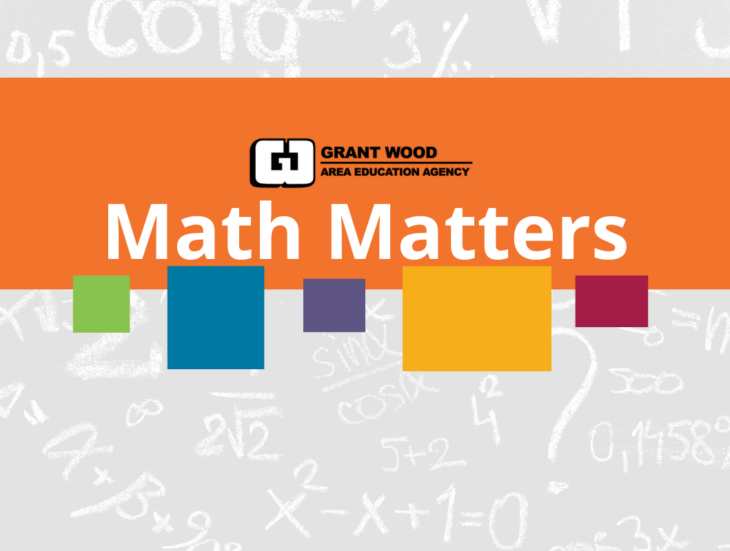
There’s a widespread myth that some people are “math people” and some people are not. Many parents, teachers and students believe this myth and it inhibits them every day in their math learning (Boaler).
- 65% of Iowa’s grades 3-12 students met the ISASP proficiency benchmark in math (2021) and 44% of Iowa graduates met the ACT Math College Readiness Benchmark. (2019)
- Iowa was one of five states showing a decrease in 8th grade NAEP scores between 2017 and 2019.
- Engagement steadily decreases through school; only 33% of high school students report high levels of engagement in school. (2018 Gallup Poll)
- Well over 50% of Americans have math anxiety. (Boaler, 2012; Beilock, 2019)
- Math anxiety starts early (in students as young as five), leading to math difficulties and avoidance that only get worse as children get older.
- Math anxiety affects the classes students select and the careers they pursue.
We’re happy to help – support is available!
(Information from Achieve the Core & Arithmetic to Algebra Gap -2016) “With the exception of a student who moved into the district this year, ALL 3rd graders are proficient or advanced in math on ISASP! I am so appreciative for the Math Project learning opportunities provided by our math consultant, the follow-up and coaching of our instructional coach, and the work of the staff!” (GWAEA Elementary Principal)
Personalized Supports:
Classroom: Modeling, coaching, co-teaching lessons, observing and providing feedback
Team: Grade level PLC team/math team/intervention and special education team support
Leadership: Support and facilitate learning with instructional coaches/building leadership; co-plan and/or facilitate professional development; support district/building review of instructional resources; support implementation of MTSS components (Universal, intervention, ADBDM)
GWAEA Math Project:
Key content has been bundled into the Grant Wood Math Project which can include three years of sustained learning, coaching and modeling in the classroom, observations and classroom feedback.
Year 1 - Number Talks
Year 2 - Progressions of Standards
Year 3 - Five Practices for Orchestrating Productive Mathematics Discussion in Problem Solving Situations
Other Learning Opportunities at GWAEA:
The Early Learning Series: The Intentional Teacher (Preschool Math, Literacy, and SEL)
Pre-K—2 Early Mathematics
Contextual Learning: Integrating Math and CTE to Become Future Ready (AMPED on Algebra, Geometry in Construction)
Emergent and Conventional Math Strategies for Significant Disabilities and Complex Learners
| Key Content of Primary Grades: Concepts, skills and problem solving related to counting principles, addition and subtraction, place value. |
|
| Pre-School numerical understanding and early grade growth in math | Predicts math achievement at age 15 |
| Early math concepts, in comparison of math, literacy and social-emotional development at entry to Kindergarten. | Were the most powerful predictors of later learning (Duncan, 2007) |
| Kindergarten early numerical understanding and gains | Predicts math and literacy knowledge 5 years later; may be linked to HS graduation |
| Key Content of Intermediate/Upper Elementary Grades: Concepts, skills, and problem solving related to multiplication and division of whole numbers and fractions. |
|
| 5th grade EOG math scores | Predicts ACT in 11th grade |
| Knowledge of fractions and division | Predicts student’s knowledge of algebra and HS math up to six years later. |
| Key Content of Middle School: Concepts, skills, and problem solving related to ratios, proportional relationships, expressions and equations, rational numbers, linear equations & functions. |
|
| 8th grade Math | May predict Alg.2 success: Less than 4% of students with high grade 8 math achievement failed Alg.2; 22% of students with low grade 8 math achievement failed it. |
| Key Content of High School: In order for students to be considered Future Ready, they need to learn algebra content and problem-solving skills. |
|
| Algebra 1 | Algebra is often considered a gate-keeper for students’ post-secondary success. |
| Algebra 2 completion | Predicts college and tech school completion. (Moore & Shulock, 2010) |
GWAEA’s Recommended Key Content for Staff:
|
|
